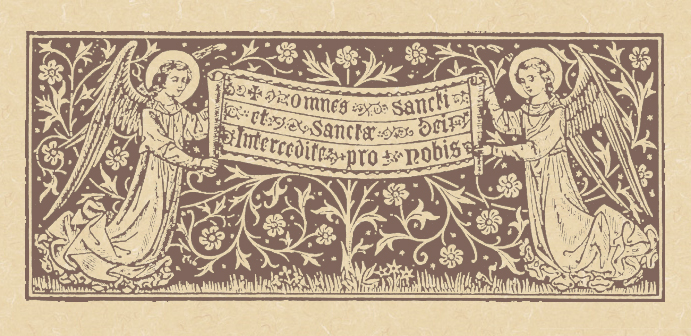

I Do Not Recommend the Fish. The Fourth Monday of Ordinary Time; the Memorial of Saint Blaise, Bishop & Martyr; or, the Memorial of Saint Ansgar, Bishop.*
The Fourth Monday after Pentecost; and, the Commemoration of Saint Blaise, Bishop & Martyr. |
And I found that to be a very astute observation; because I’ve found—and perhaps you have, too—that even people who pray very much are secretly wishing that God would keep His nose out of it. I think of Saint Augustine who, before his conversion, while in the midst of a life of reckless abandonment, prayed to God saying, “God, give me chastity, but not yet.” We want things from God. We want relief from our sufferings, we want an end to our troubles, we want to enjoy good health, we want family harmony, we want success in our relationships, and God is not adverse to giving us these things; but, that’s not all you get when you haggle with God. When you accept Christ into your life, your whole life changes, or at least it should. This is what our Lord meant when he said, “If anyone wishes to come after me, he must deny himself and take up his cross daily and follow me” (Luke 9: 23 NABRE). In other words, it’s a package deal: the price is that you give yourself completely to Him. And there’s a lot of us who don’t want that deal. I remember when I was first ordained chatting with one of the neighbors who lived in the house behind the church, and she was chewing my ear off about all of her problems, and why doesn’t God ever listen to her prayers. And as it turned out she wasn’t practicing any religion at all with any regularity, and had lived with a succession of men, both in and out of marriage. And here’s she’s wondering why God has not come to her rescue. She wants the benefits of a relationship with Christ, but she doesn’t want the relationship itself; because any relationship—particularly one with God—is a two way street. It’s like a man who finds a nice girl who loves him, but he only wants what he can get from her, and he’s not interested in any kind of commitment to her. So he strings her along and takes what he wants without giving her the kind of security and protection that that kind of relationship implies, until he’s used her to the point that she just loses patience. Well, our Lord Jesus Christ is very patient, but He is not a milquetoast. He certainly is willing to forgive us when we go astray, particularly in the sacrament of confession, but even the forgiveness we receive in confession implies an effort to change. If we’re continually praying to God for this or that, but aren't making any effort to live a life that conforms to his plan as found in the Gospel and the teachings of the Church and of the Fathers, then what’s in it for Him? How long can we reasonably expect God to go on watching over us, protecting us, comforting us, simply because we’ve asked Him to, but continue to reject Him in the way we live our lives? And when our lives are over, and a decision must be made regarding the final disposition of our souls, what will we have to show in return for all we have received from God? Will we not say something like, “Well, I knew what Christ wanted, but it was too much for me to handle; I did the best I could.” Will we really have done our best? Or will we have simply convinced ourselves that what we were willing to do was our best, when, in fact, we never really knew what our best was because we never really tried? The Gerasenes had to be impressed by our Lord casting out demons and helping this man whom no one else could help. But they understood the implications of his presence among them; and, while they were happy for the man who was now free, they weren’t willing to give anything in return; so they asked him to leave. Which He did. God forbid that any of us, who have received so much from our Lord, would ask Him to leave.
|